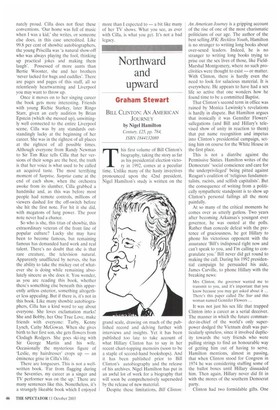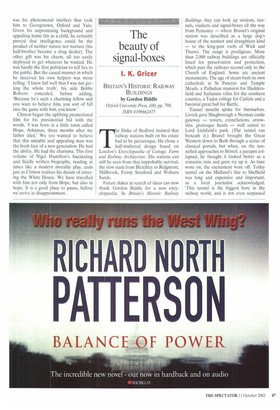Northward and upward
Graham Stewart
BILL CLINTON: AN AMERICAN JOURNEY by Nigel Hamilton Century. £25, pp. 784, ISBN 1844132080 This first volume of Bill Clinton's biography, taking the story as far as his presidential election victory in 1992, comes at a peculiar time. Unlike many of the hasty invectives pronounced upon the 42nd president, Nigel Hamilton's study is written on the
grand scale, drawing on much of the published record and delving further with interviews and insights. Yet it has been published too late to take account of what Hillary Clinton has to say in her recent chart-topping memoirs (soon to be a staple of second-hand bookshops). And it has been published prior to Bill Clinton's autobiography and the release of his archives. Nigel Hamilton has put in an awful lot of work for a biography that will soon be comprehensively superseded by the release of new material.
Despite these limitations, Bill Clinton: An American Journey is a gripping account of the rise of one of the most charismatic politicians of our age. The author of the best selling TFIC: Reckless Youth, Hamilton is no stranger to writing long books about over-sexed leaders. Indeed, he is no stranger to writing long books trying to prise out the sex lives of those, like FieldMarshal Montgomery, where no such proclivities were thought to exist — or matter. With Clinton, there is hardly even the need to look for salacious material. It is everywhere. He appears to have had a sex life so active that one wonders how he found time to be a committed Baptist.
That Clinton's second term in office was ruined by Monica Lewinslcy's revelations is hardly in dispute. But Hamilton argues that ironically it was Gennifer Flowers' sallegations (and Bill and Hillary's televised show of unity in reaction to them) that put name recognition and impetus into Clinton's presidential campaign, setting him on course for the White House in the first place.
This is not a diatribe against the Permissive Sixties. Hamilton writes of the Democrats' social conscience and care for the underprivileged' being pitted against Reagan's coalition of 'religious fundamentalists, racists, and selfish capitalists'. But the consequence of writing from a politically sympathetic standpoint is to show up Clinton's personal failings all the more painfully.
At so many of the critical moments he comes over as utterly gutless. Two years after becoming Arkansas's youngest ever governor, he was ousted at the polls. Rather than concede defeat with the pretence of graciousness, he got Hillary to phone his victorious opponent with the assurance 'Bill's indisposed right now and can't speak to you, and I'm calling to congratulate you.' Bill never did get round to making the call. During his 1992 presidential campaign he persuaded his aide, James Carville, to phone Hillary with the breaking news:
Mrs Clinton, the governor wanted me to transmit to you, and it's important that you know because you may get asked about it ... There's this paper called The Star and this woman named Gennifer Flowers
It was not just his sex life that trapped Clinton into a career as a serial deceiver. The manner in which the future commander-in-chief of the world's only superpower dodged the Vietnam draft was particularly spineless, since it involved duplicity towards the very friends who were pulling strings to find an honourable way of getting him out of having to serve. Hamilton mentions, almost in passing, that when Clinton stood for Congress in 1974 he was considering stuffing some of the ballot boxes until Hillary dissuaded him. Then again, Hillary never did fit in with the mores of the southern Democrat party.
Clinton had two formidable gifts. One was his phenomenal intellect that took him to Georgetown, Oxford and Yale. Given his unpromising background and appalling home life as a child, he certainly proved that intelligence could be the product of neither nature nor nurture (his half-brother became a drug dealer). The other gift was his charm, all too easily deployed to get whatever he wanted. He was hardly the first politician to tell lies to the public. But the casual manner in which he deceived his own helpers was more telling. 'I knew full well that I was not getting the whole truth', his aide Bobby Roberts conceded, before adding, 'Because he's such a charming fellow and you want to believe him, you sort of fall into the game with him, you know.'
Clinton began the uplifting promotional film for his presidential bid with the words, 'I was born in a little town called Hope, Arkansas, three months after my father died.' We too wanted to believe that this amiable and appealing man was the fresh face of a new generation. He had the ability. He had the charisma. This first volume of Nigel Hamilton's fascinating and fluidly written biography, reading at times like a modern morality play, ends just as Clinton realises his dream of entering the White House. We have travelled with him not only from Hope, but also in hope. It is a good place to pause, before we arrive in disappointment.



















































































 Previous page
Previous page